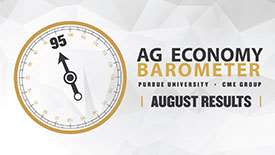By Jennifer Stewart-Burton

After months of increases in producer sentiment toward the U.S. agricultural economy, the August reading of the Purdue/CME Group Ag Economy Barometer showed that declining commodity prices are weighing on the minds of producers.
Producer sentiment declined sharply to 95 - a 17-point drop from the July reading. The barometer is based on a monthly survey of 400 U.S. agricultural producers and includes measures of sentiment toward current conditions and future expectations.
The Index of Current Conditions fell from 93 in July to 80 in August, while the Index of Future Expectations dropped to 102 from July’s 121.
“This was in sharp contrast to July when farmers’ optimism about future prospects pushed the barometer up, despite their concerns about current economic conditions,” said Jim Mintert, the barometer’s principal investigator and director of Purdue’s Center for Commercial Agriculture. “Farmer sentiment in late spring and early summer was buoyed by a spring rally in key commodity prices, but near-ideal growing conditions for corn and soybeans this summer helped push yield prospects up and crop prices down sharply.”
Since the peak of the price rally in mid-June, December 2016 corn futures have fallen by more than $1 per bushel and November soybean futures by $1.75 per bushel.
In its August Crop Production report, the U.S. Department of Agriculture indicated that record corn and soybean yields are expected this fall. If that’s the case, carryover stocks for both crops will grow, potentially resulting in the lowest corn prices in a decade.
Unsurprisingly, the resulting tighter operating margins are leading to adjustments in production costs, said David Widmar, senior research associate who works on the barometer.
“What is somewhat surprising is that more producers expect input prices to rise in 2017 than decline,” he said. “This was especially true for crop protection products, as nearly one-third of respondents expected prices to increase for herbicides, insecticides and fungicides. The long-term trend for crop input prices to rise seems to be leading to skepticism regarding prospects for input prices to decline, despite the lack of profitability among crop producers.”
Source:purdue.edu